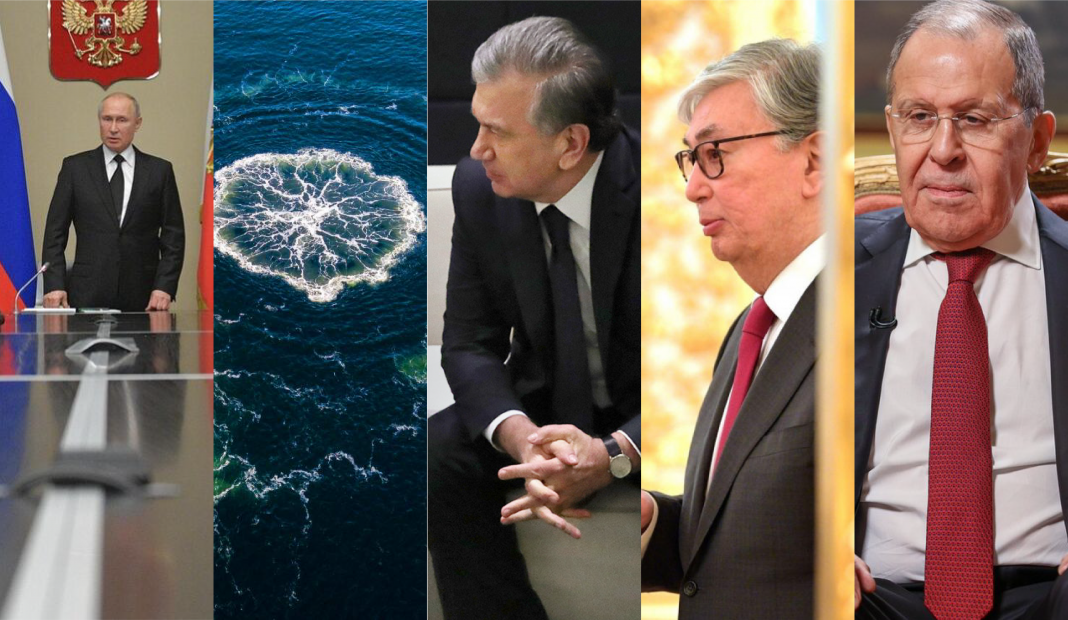This report describes the key events that had an important impact on the political, economic and social processes inside Russia.
Based on the results of the past week, the following key events can be brought to attention:
- Russia continues to strengthen its position in Central Asia and is trying to pay more attention to this issue. The weakening of US influence on domestic political processes in Kazakhstan, Uzbekistan, and several other states in the region, plays into the hands of Moscow and provides opportunities for new manoeuvres.
- Putin is demonstrating his readiness to continue fighting in Ukraine, trying to show the resilience of the Russian economy in the face of Western sanctions. Despite the persistent stereotype, Moscow is in no hurry to break off relations with the West; in fact, like the West with Moscow: negotiations are being conducted at different levels, and contacts between the two states are increasingly becoming public. There is an attempt to finalise the terms of possible negotiations on both sides.
- Russia is concerned about the situation in several nearby countries. First of all, we are talking about Moldova, Georgia, the states of Central Asia and Belarus. In this context, the recent meeting of the Security Council of the Russian Federation, the main topic of which was the situation in the EAEU, is indicative. The discussion results are unknown – the meeting itself and Lavrov’s report took place behind closed doors. However, the fact that the stated topic was discussed at the Security Council of the Russian Federation shows that there are a lot of problems, and the Russian leadership sees a potential threat to the stability of its neighbours (and, therefore, potential instability at its borders).
During 6th-12th of March the following topics were the most relevant for Russia:
1. Telephone conversations between Vladimir Putin and Kassym-Jomart Tokayev
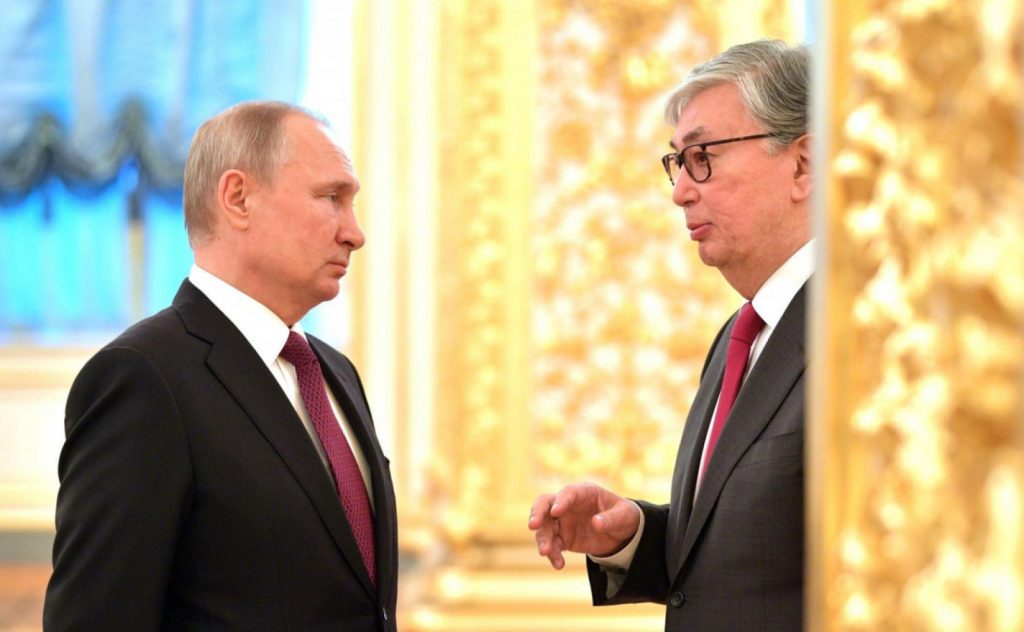
On Monday, March 6, Vladimir Putin had a telephone conversation with the President of Kazakhstan, Kassym-Jomart Tokayev. According to the Russian official statements, various practical aspects of the development of mutually beneficial bilateral trade and economic cooperation, including in the energy, transport, logistics and humanitarian fields, were discussed in detail during the conversation. The leaders reaffirmed their intention to strengthen Russian-Kazakh allied relations further and agreed to continue contact. At the same time, the official statement of the Kazakh side notes that special attention was paid to the expansion of transit and transport routes and trade and economic ties.
Outcomes and outlook:
When analysing the political situation in Kazakhstan, it is worth noting that recently the attitudes towards Tokayev and his policies have changed dramatically in the Western media. So if a year ago Tokaev was considered one of the few leaders in the post-Soviet space who openly contradicted Putin and built a de facto anti-Russian policy, now he is increasingly accused of excessive sympathy for Moscow, with which he allegedly synchronises all actions.
Of course, Tokayev cannot be called an anti-Russian politician, but at the same time, one should not accuse him of being too friendly with Russia. He actively demonstrates a policy of pragmatism, starting from common interests with China, Turkey, Russia and several Western states. This approach allows you to maintain a stable position and form reliable relationships. During mass protests in early 2022, Tokayev brought in the CSTO to suppress them, which many saw as strengthening Russian positions in Kazakhstan. Sometime later, Tokayev openly criticised some of Putin’s positions and refused to recognise the “DNR” and “LNR”.
At present, relations between Russia and Kazakhstan have great potential, which lies in several economic, political and energy projects. First of all, it is worth considering the geopolitical situation, where in the conditions of the formation of a new world order in the Asian region, a new system of relationships is being formed. Strengthening Russia in this region also creates new opportunities and new challenges.
Since last year, Russia has been trying to step up the process of creating a tripartite gas union with the participation of Kazakhstan and Uzbekistan. This issue was actively discussed in October last year at the Russia-Central Asia summit and at the beginning of December 2022 at the EAEU summit in Bishkek (Kyrgyzstan).
The gas transportation project, which significantly enhances gas transit to China, is becoming increasingly relevant and has every chance of being implemented. The only question is how pragmatic a position Tokayev can build, considering all the interests of China, Russia and some transnational corporations that have a noticeable influence on several western regions of Kazakhstan.
Notably, the telephone conversations took place a day after the meeting between Kassym-Jomart Tokayev and his Uzbek counterpart Shavkat Mirziyoyev in the border city of Shymkent. This meeting occurred immediately after US Secretary of State Anthony Blinken’s visit to Central Asia: Washington demands that Astana and Tashkent implement anti-Russian sanctions and keep as much distance from Russia as possible. Interestingly, during the meeting in Shymkent, Tokayev and Mirziyoyev confirmed their position regarding creating a multimodal transport corridor across the Caspian, which Blinken vehemently opposed. In addition, Kazakhstan and Uzbekistan also confirmed their participation in the agreement on the “Green Corridor” in the transport field, which will include Russia, Kyrgyzstan, Turkmenistan, Uzbekistan, Iran and Kazakhstan.
2. Telephone conversations between Vladimir Putin and Shavkat Mirziyoyev
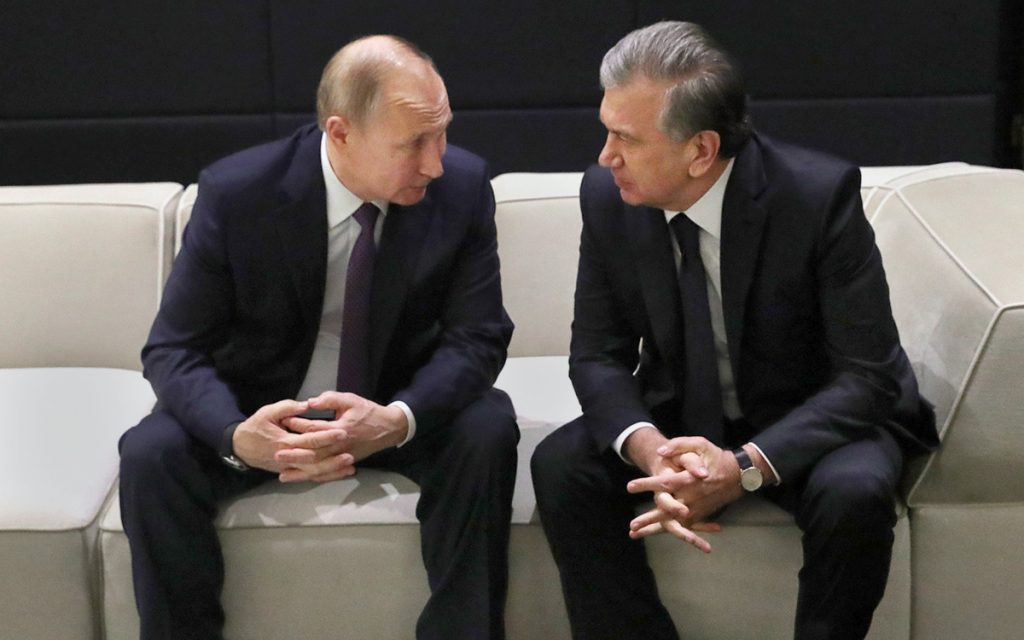
On Monday, March 6, a telephone conversation took place with the President of Uzbekistan, Shavkat Mirziyoyev. According to the Administration of the President of the Russian Federation, during the conversation, several topical issues were discussed for the further development of Russian-Uzbek relations of strategic partnership and alliance, including those related to the implementation of promising projects in the trade and economic sphere. Furthermore, Uzbekistan noted that during the conversation, issues of maintaining the dynamics of growth in trade turnover, promoting investment projects and expanding industrial cooperation in various sectors of the economy with the participation of leading companies and enterprises of the two countries were discussed. In addition, significant attention was paid to further building interregional cooperation and intensifying cultural and humanitarian exchanges.
Outcomes and outlook:
Considering that on the same day, Putin held telephone conversations with the presidents of Kazakhstan and Uzbekistan, it becomes more and more logical to assume that the project to create a tripartite gas transport union will be activated.
Earlier, Mirziyoyev was the only member of the tripartite alliance who was in no hurry to respond to Putin’s proposal. Moreover, immediately after the October Russia-Central Asia summit, active discussions began that Uzbekistan intends to abandon this project under pressure from the United States.
The previous conversation between the leaders of Russia and Uzbekistan took place on January 4, 2023, and even then, Ascolta predicted that the parties could still agree on several aspects that would allow moving towards the implementation of the gas transportation project.
Given the current events in the region, primarily related to the final formation of power in China and its more active involvement in the processes in the geopolitical arena, it is worth noting the gradual inclination of Uzbekistan’s positions towards joint projects at the regional level. In this case, the concern of the United States, which is losing its influence in the region, becomes increasingly noticeable.
Anthony Blinken’s latest visit to Central Asia was a complete failure. In fact, during a meeting of their presidents in Shymkent on March 5, 2023, Uzbekistan and Kazakhstan decided to follow something other than American instructions.
At the same time, it is worth noting the increasing risks of creating new centres of instability in the region. First, such a threat hangs over Uzbekistan, demonstrating the highest development rates among all the states of the post-Soviet space and skillfully balancing the interests of Russia, China and the United States. A referendum on a new version of the constitution is scheduled for the end of April in the country. The amendments proposed by President Mirziyoyev were planned to be adopted last year, but the law was withdrawn for revision due to protests. And although the new constitution looks more liberal, it is reasonable to assume that similar events in Uzbekistan can be used for repeated protests and anti-government rallies.
3. Sergei Lavrov’s interview to Channel One
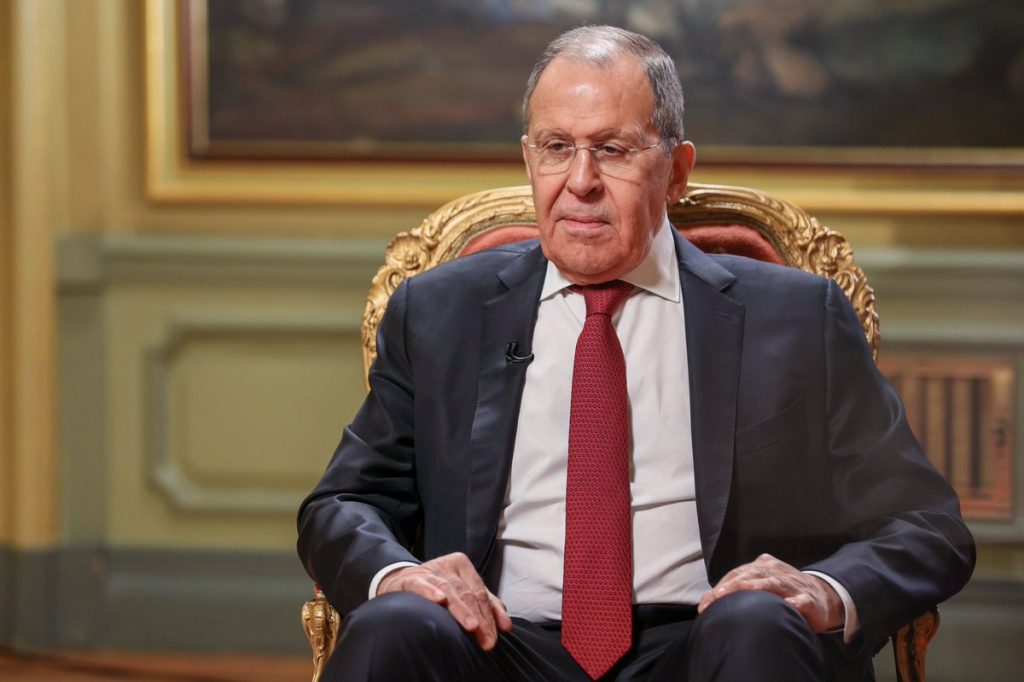
On Friday, March 10, the Russian Channel One published a lengthy interview with Russian Foreign Minister Sergei Lavrov. In it, the head of the Russian Foreign Ministry once again tried to voice the position of the Russian Federation on several geopolitical issues affecting the interests of Moscow. In particular, they discussed Ukraine, Georgia, relations with the West, Nord Streams and further prospects.
Key theses:
- “The events in Georgia are very similar to the Kyiv Maidan. There is no doubt that the law on the registration of those non-governmental organizations that receive foreign funding in the amount of 20% of everything from their budget was just an excuse to start an attempt to change power by force. However, if you take the law itself, it pales compared to how non-profit activities are regulated in the United States, France, India, or Israel.
- “Here you are: in Georgia, the opposition is obliged to do what it wants, but in Moldova, protests against the current government are condemned because the opposition in Georgia reflects Western interests, while the opposition in Moldova reflects other interests.”
- “It seems to me that all countries around the Russian Federation should conclude how dangerous the course of involvement in the zone of interests of the United States is.”
- “They [the West] were waiting for an excuse to “grab” Russia and the moment to do it. As a result, Russia began to be perceived as too independent a player. We were gaining economic strength not as powerful as China or India but remained among the leading economies. We have serious moral and political positions in the international arena. We speak on key issues for developing countries from the standpoint of justice and criticism of the system that the West would like to preserve in the post-colonial era on the principles of striving to live at the expense of others.”
- “Events in Georgia are orchestrated from outside and are of the same nature. This is the desire to create an “irritant” on the borders of Russia; moreover, in a country where the current government (like the Ukrainian government of V.F. Yanukovych in 2013) thinks primarily about the economic interests of its state and refuses to join anti-Russian sanctions.”
- “[About the meeting with Blinken on the sidelines of the G20] We spoke constructively, without any emotions, shook hands at the meeting and parted. It was a normal conversation. I don’t know to what extent this reflects the US understanding of the abnormality of the situation when they cut off all channels of dialogue. But speaking like a human being “on the sidelines” of some event has never been a sensation.”
- “You heard the next statements. CIA director William Burns said yesterday that it is not clear that Russia is interested in a peaceful settlement. And the fact that VA Zelensky is “interested”, is it evident? He again, simultaneously with W. Burns, declared that he would never sit down at the negotiating table with V. V. Putin. This is out of the question. Only a “complete victory” for Ukraine, that he has allies in other formats and with them, he will decide the issues of the future of his country.”
- “[About Nord Streams] When S. Hersh published his material, a gentleman by the name of N. Price, who, at the end of his career in the press service of the US State Department, goes somewhere directly to E. Blinken, called it “nonsense”. As before, everything related to the facts pointing to the possible role of the United States (I would even say the very likely role of the US government) is called “nonsense”, nonsense, fiction, etc. And no investigation is needed. They say that national examinations are underway, which is allegedly enough.
- All of a sudden, on the very same day (they coordinate their public plans and projects very poorly), the press secretary of the US President, C.Jean-Pierre, at a briefing, demanded an international investigation into reports of poisonings in schools in the Islamic Republic of Iran. An international inquiry, although no one was badly hurt there. But no research is needed on the issue of a direct attack on critical energy infrastructure facilities. Because the Swedes, Danes and Germans will “figure it out” themselves. You know that in Western states, an attack on critical infrastructure is equated to a declaration of war in their fundamental laws. In this particular case, if it is established that a terrorist attack against a NATO country, against its critical infrastructure, was organized by another country of the bloc, then the question arises: what is the point of the North Atlantic Alliance, which declared its goal supposedly to protect member countries from outside attack if it this allows attacks on one of its members from within. It’s such an interesting question.”
- “We have many Russian proverbs that Sovietologists should know: “measure seven times, cut once”, “Russian peasant harnesses for a long time, but drives fast”. I don’t want to threaten or threaten anyone. I don’t want to hint at anything. I know that this flagrant terrorist attack will not remain uninvestigated. Suppose an investigation is blocked, an objective, impartial, transparent one (which will not be reduced to the fact that they say the Swedes, Danes and Germans “resolved” something there, let this be the final verdict), of course. In that case, we will think about how to answer West on this direct attack, an attempt (by and large) on our property.
- “…more than twenty years ago, my great predecessor E.M.Primakov came up with the initiative to create a “troika” of the RIC (Russia, India, China). Then the whole concept of a multipolar world was formulated. Its diplomatic embodiment was the creation of the RIC. Now, nothing is said about him because BRICS was created based on the RIC. It now diverts all the attention of those watching the emergence of new centres of power. But RIC continues to work. More than eighteen meetings of foreign ministers have already taken place, and experts from other departments in agriculture, high technology, energy, space and many other areas are meeting.”
- “Speaking about the consequences and possible global aspects of the Ukrainian crisis, the word “breaking” is quite appropriate. In his speeches, he mentioned several times that a new multipolar world order was now being formed. This process is not something that will not end quickly, but will constitute a whole historical epoch.”
- “That is why we ask our American, European, and British colleagues the question: since they write “rules-based world order” everywhere, can we see the “rules”? It is forbidden. It is also impossible to look at the list of the names of those whose bodies were shown on April 3, 2022, in the Kyiv suburb of Bucha, with the accusation of Russia that it was her doing. Sanctions were immediately imposed under this “mute”. Until now, we can not achieve at least these names. No one is talking about any investigation. As well as about the crime investigation on May 2, 2014, in Odessa, when 50 people were burned alive. There is video footage of those who did it.”
- “When they celebrated the 75th anniversary of the Victory in 2020 in America (maybe you saw), they issued a commemorative coin dedicated to the victory over fascism. There are three engraved flags: American, British and French. There is no Soviet or Russian flag there. And it’s not even written that “someone else” fought with A in addition to the three countries. Hitler.”
- “I don’t know what the new world order will be like. We sincerely signed documents that set down the principles to which we have remained faithful. But the West crushed them. This is the indivisibility of security, the unacceptability of attempts to strengthen one’s security at the expense of the safety of others, and the inadmissibility of a situation where any country or organization claims to dominate the international arena.
- “Pay attention to the statements of the Chinese leadership a year after the start of the [so-called] “special military operation”. China for Peace. We appreciate his calls to respect the UN Charter. We act from the same positions. We interpret it not selectively, but in its entirety, including the inadmissibility of infringing on peoples’ right to self-determination.”
Outcomes and outlook:
In fact, in an interview with Channel One, Lavrov tried to demonstrate Russia’s updated position regarding negotiations with the West on forming a new world order. However, Lavrov’s theses turned out to be not new but only slightly corrected, considering recent events.
Apparently, Lavrov tried to emphasise the fact that in other relations with the West, Russia would use similar tools, accusing Europe and the United States of violating international norms and rules while arguing everything not with specific facts but only with populist statements and loud accusations.
More and more noticeable is Lavrov’s attempt to change the rhetoric, making it more constructive and understandable. In this case, it is essential to note that this is not a desire to become more understandable for the West, but rather to synchronise their positions with the East – the conditional “diplomatic calm” of China, India and other regional players who are used to demonstrating a more moderate and balanced position, noticeably different from the motley and the “loud” manner of Western states. Lavrov says: “We are not interested in what the West thinks of us; the main thing is that we get tacit consent or even support in the East.”
In general, Lavrov, on behalf of Russian diplomacy, is once again trying to draw a line between Russia and the West, pointing out that, in Moscow’s understanding, the new world order will be divided into two poles and Russia’s future lies much closer to Asia than to Europe.
Regarding Ukraine, Lavrov also once again declared his readiness for negotiations, accusing Kyiv of unwillingness to sit down at the negotiating table and actually of starting a war. Of course, this rhetoric is not new to Russia. Still, lately, it has been increasingly addressed to the West, which, according to Moscow, is not a mediator but a full-fledged party to the conflict.
Thus, we can assume that Lavrov’s interview is a de facto declaration of Russia’s renewed position, from which it is ready to sit down at the negotiating table with the United States and other participants in geopolitical battles. Therefore, shortly, we should expect not even words but specific actions from the “collective West”, which will demonstrate its readiness for the escalation or de-escalation of relations between the West and the East.
4. New versions regarding explosions in “Nord Streams”
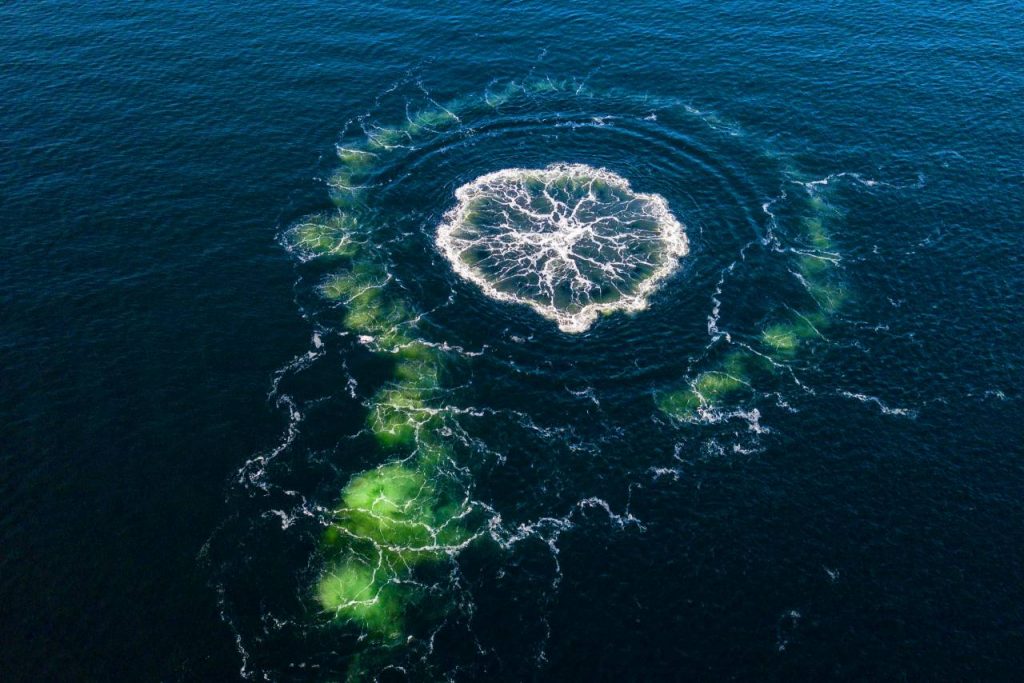
On Tuesday, March 7, information appeared in several Western media almost simultaneously, allegedly citing data from Western intelligence communities, according to which a specific “Ukrainian group” was involved in the explosions on the Nord Stream and Nord Stream 2 gas pipelines. As a result, this topic has become an occasion for active discussions in the West and Russia.
Timeline:
- The New York Times, citing intelligence sources, reported that a “pro-Ukrainian group” was behind the Nord Stream sabotage, which could include both Ukrainians and Russians opposed to Vladimir Putin. The publication also recalls that immediately after the explosions, Poland and Ukraine hastened, without providing hard evidence, to blame Russia for it.
- The Die Zeit article followed the NYT. According to the publication, the operation at sea was carried out by a group of six people, which included two divers and two of their assistants. They delivered the explosives to the gas pipeline. In addition, the article alleges that the operation involved a vessel leased by a Polish company owned by two Ukrainian citizens.
- A few hours later, an article on the same topic appeared in the Washington Post. In a publication that also relies heavily on anonymous sources.
- At the same time, all three publications noted that they did not have any information about the involvement of the Ukrainian authorities in the sabotage at Nord Stream.
- In Russia, this version was called implausible and stated that it was a “coordinated stuffing”: “Obviously, the authors of the attack want to divert attention. […] It’s not just weird. This smells like a heinous crime. At a minimum, the countries that are shareholders of the “streams” and the UN should demand an urgent, transparent investigation with the participation of everyone who can shed light,” Putin’s spokesman Dmitry Peskov said.
- A similar statement was made by the official representative of the Russian Foreign Ministry, Maria Zakharova: “I wonder who allows such leaks, filling the information space with them? – she wrote in her telegram channel. – Answer: those who do not want to conduct an investigation in the legal area will divert the audience’s attention from the facts in every possible way.
Outcomes and outlook:
Attempts to “shift the focus” towards Ukraine are by no means a new technique that the West has used in the situation that has developed after the publication of the Seymour Hersh report. This report provides evidence that allegedly proves the involvement of the United States and several Western states in organising explosions on the Nord Stream. Ascolta has already written that the Hersh report aimed at forcing the West to justify itself and make statements about its non-involvement in the incident. In the US, they decided not to follow the line of excuses but to announce that the explosion on the Nord Stream was a private initiative – including Ukrainians. The informal “leakage” of information in the media, allegedly regarding the special services, a hint at some anonymous “big businessman” who financed this action – all this should translate Hersh’s conspiracy theory into a new direction. Since Ukraine is already in a state of undeclared war with Russia, the participation of its representatives in blowing up pipelines should not raise any questions. However, in
Russia, the NYT version was sharply criticised: there are a lot of inconsistencies. To carry out such an operation, a large amount of explosives is required, which could not be transported by a conventional yacht, as well as appropriate equipment and qualifications of specialists (there is no such level of submarine specialists in Ukraine). Thus, we see an alarming trend: soon, almost all sabotage against Russia, its assets and interests will be attributed to Ukrainians, which as a result, may lead to a drop in sympathy for Ukraine in the world.
5. Meeting with permanent members of the Security Council of the Russia
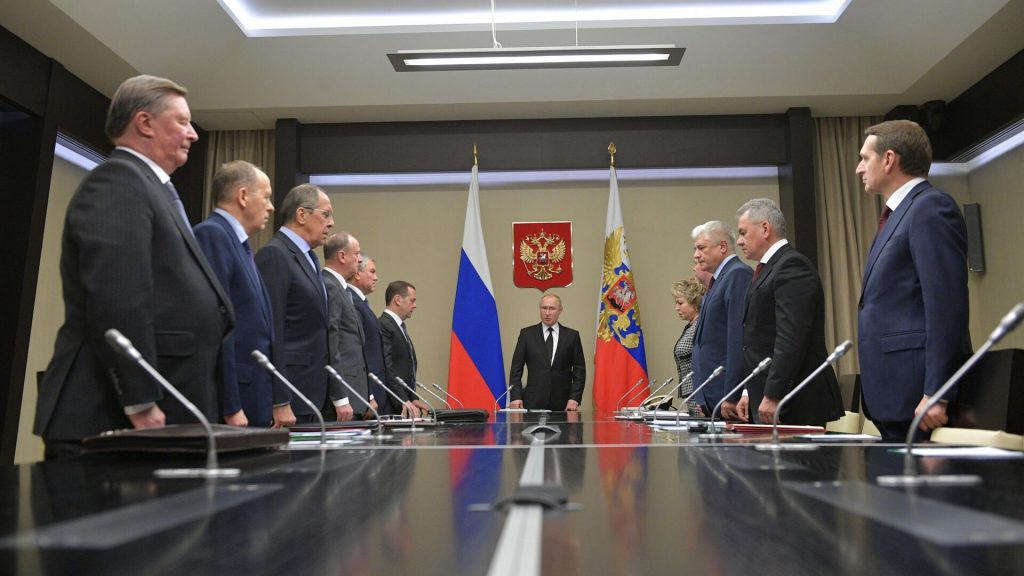
On Friday, March 10, Vladimir Putin held an operational meeting via videoconference with the permanent members of the Russian Security Council. Prime Minister Mikhail Mishustin, Chairman of the Federation Council Valentina Matvienko, Speaker of the State Duma Vyacheslav Volodin, Deputy Chairman of the Security Council Dmitry Medvedev, Secretary of the Security Council Nikolai Patrushev, Interior Minister Vladimir Kolokoltsev, Foreign Minister Sergei Lavrov, Defense Minister Sergei Shoigu, Director of the Federal Security Service Alexander Bortnikov, Director of the Foreign Intelligence Service Sergei Naryshkin, Special Representative of the President for Environmental Protection, Ecology and Transport Sergei Ivanov attended the meeting. The main announced topic of the meeting was “development of relations with neighbours and allies in the EAEU”, and Sergei Lavrov was the keynote speaker. As before, the meeting was held behind closed doors.
Outcomes and outlook:
According to Ascolta, Lavrov’s report touched upon the possible risks for the post-Soviet states in connection with the increased activity of Western legal and illegal structures aimed at creating a zone of instability along the perimeter of Russia’s borders. The reasons for the report were the visit of Anthony Blinken to the countries of Central Asia, Armenian-Azerbaijani relations (an attempt by the United States to seize the initiative in the negotiation process), tensions in Moldova and events in Georgia (which, not being a member of the EAEU, at the same time develops economic relations with the states Union).
The discussion results are unknown as the meeting itself, and Lavrov’s report took place behind closed doors. However, the fact that the stated topic was discussed at the Russian Security Council shows that there are a lot of problems, and the Russian leadership sees a potential threat to the stability of its neighbours (and, therefore, potential instability at its borders).
6. Personal sanctions of the Russian Federation concerning citizens of the Baltic countries
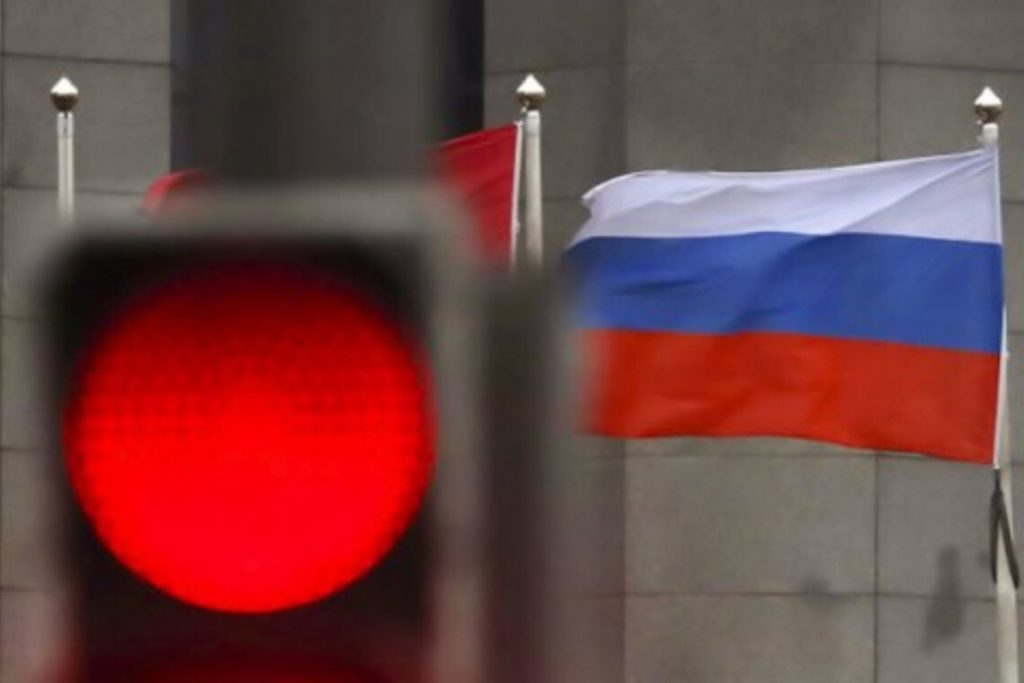
On Thursday, March 9, the Russian Ministry of Foreign Affairs announced the introduction of personal sanctions against 144 Estonia, Latvia and Lithuania citizens. The statement said this step was taken, among other things, as a response to the imposition of anti-Russian sanctions by the Baltic countries and “incitement of Russophobic sentiments.” It is noted that the “stop list” includes the most hostile to Russian ministers, parliamentarians, public figures, and journalists from Latvia, Lithuania and Estonia. The list of names has not yet been published.
Outcomes and outlook:
Russia decided to mirror the actions of several European states and, in response to the personal sanctions imposed on Russian citizens, introduce the same sanctions against citizens of “hostile states” – primarily against the Baltic countries. At the same time, the sanctions are rather symbolic: the level of relations between Russia and the Baltic countries in the last decade has been shallow. Instead, this is a gesture from Russia, addressed to the West as a whole: Russia will soon begin the introduction of various kinds of sanctions – from personal to sectoral – in an attempt to hit the most painful areas in the life of Europe. At least Russia is not going to normalise relations with the West.

